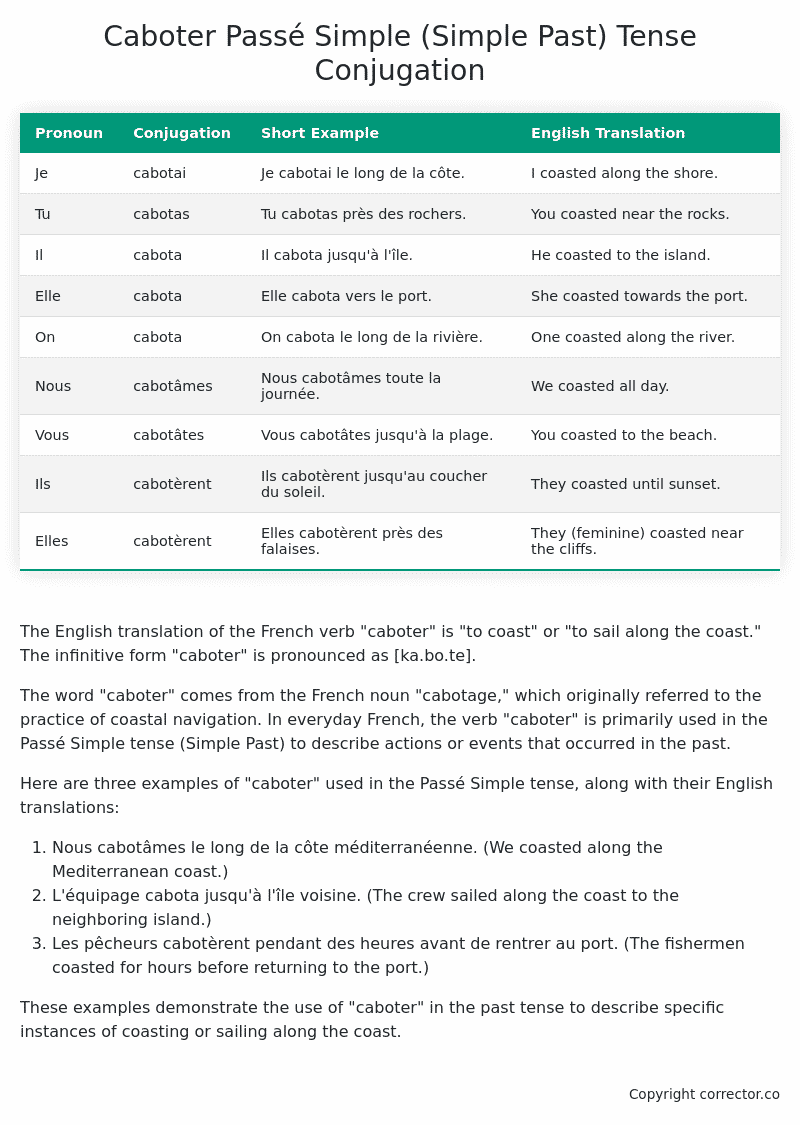Passé Simple (Simple Past) Tense Conjugation of the French Verb caboter
Introduction to the verb caboter
The English translation of the French verb “caboter” is “to coast” or “to sail along the coast.” The infinitive form “caboter” is pronounced as [ka.bo.te].
The word “caboter” comes from the French noun “cabotage,” which originally referred to the practice of coastal navigation. In everyday French, the verb “caboter” is primarily used in the Passé Simple tense (Simple Past) to describe actions or events that occurred in the past.
Here are three examples of “caboter” used in the Passé Simple tense, along with their English translations:
- Nous cabotâmes le long de la côte méditerranéenne.
(We coasted along the Mediterranean coast.) - L’équipage cabota jusqu’à l’île voisine.
(The crew sailed along the coast to the neighboring island.) - Les pêcheurs cabotèrent pendant des heures avant de rentrer au port.
(The fishermen coasted for hours before returning to the port.)
These examples demonstrate the use of “caboter” in the past tense to describe specific instances of coasting or sailing along the coast.
Table of the Passé Simple (Simple Past) Tense Conjugation of caboter
| Pronoun | Conjugation | Short Example | English Translation |
|---|---|---|---|
| Je | cabotai | Je cabotai le long de la côte. | I coasted along the shore. |
| Tu | cabotas | Tu cabotas près des rochers. | You coasted near the rocks. |
| Il | cabota | Il cabota jusqu’à l’île. | He coasted to the island. |
| Elle | cabota | Elle cabota vers le port. | She coasted towards the port. |
| On | cabota | On cabota le long de la rivière. | One coasted along the river. |
| Nous | cabotâmes | Nous cabotâmes toute la journée. | We coasted all day. |
| Vous | cabotâtes | Vous cabotâtes jusqu’à la plage. | You coasted to the beach. |
| Ils | cabotèrent | Ils cabotèrent jusqu’au coucher du soleil. | They coasted until sunset. |
| Elles | cabotèrent | Elles cabotèrent près des falaises. | They (feminine) coasted near the cliffs. |
Other Conjugations for Caboter.
Le Present (Present Tense) Conjugation of the French Verb caboter
Imparfait (Imperfect) Tense Conjugation of the French Verb caboter
Passé Simple (Simple Past) Tense Conjugation of the French Verb caboter (You’re reading it right now!)
Passé Composé (Present Perfect) Tense Conjugation of the French Verb caboter
Futur Simple (Simple Future) Tense Conjugation of the French Verb caboter
Futur Proche (Near Future) Tense Conjugation of the French Verb caboter
Plus-que-parfait (Pluperfect) Tense Conjugation of the French Verb caboter
Passé Antérieur (Past Anterior) Tense Conjugation of the French Verb caboter
Futur Antérieur (Future Anterior) Tense Conjugation of the French Verb caboter
Subjonctif Présent (Subjunctive Present) Tense Conjugation of the French Verb caboter
Subjonctif Passé (Subjunctive Past) Tense Conjugation of the French Verb caboter
Subjonctif Imparfait (Subjunctive Imperfect) Tense Conjugation of the French Verb caboter
Subjonctif Plus-que-parfait (Subjunctive Pluperfect) Tense Conjugation of the French Verb caboter
Conditionnel Présent (Conditional Present) Tense Conjugation of the French Verb caboter
Conditionnel Passé (Conditional Past) Tense Conjugation of the French Verb caboter
Conditionnel Passé II (Conditional Past II) Tense Conjugation of the French Verb caboter
L’impératif Présent (Imperative Present) Tense Conjugation of the French Verb caboter
L’impératif Passé (Imperative Past) Tense Conjugation of the French Verb caboter
L’infinitif Présent (Infinitive Present) Tense Conjugation of the French Verb caboter
L’infinitif Passé (Infinitive Past) Tense Conjugation of the French Verb caboter
Le Participe Présent (Present Participle) Tense Conjugation of the French Verb caboter
Le Participe Passé (Past Participle) Tense Conjugation of the French Verb caboter
Struggling with French verbs or the language in general? Why not use our free French Grammar Checker – no registration required!
Get a FREE Download Study Sheet of this Conjugation 🔥
Simply right click the image below, click “save image” and get your free reference for the caboter Passé Simple tense conjugation!

Caboter – About the French Passé Simple (Simple Past) Tense
Formation
Usage
Narration
Historical Context
Interactions with other tenses
Passé Composé
Imparfait
Conditional and Subjunctive
Summary
I hope you enjoyed this article on the verb caboter. Still in a learning mood? Check out another TOTALLY random French verb conjugation!


